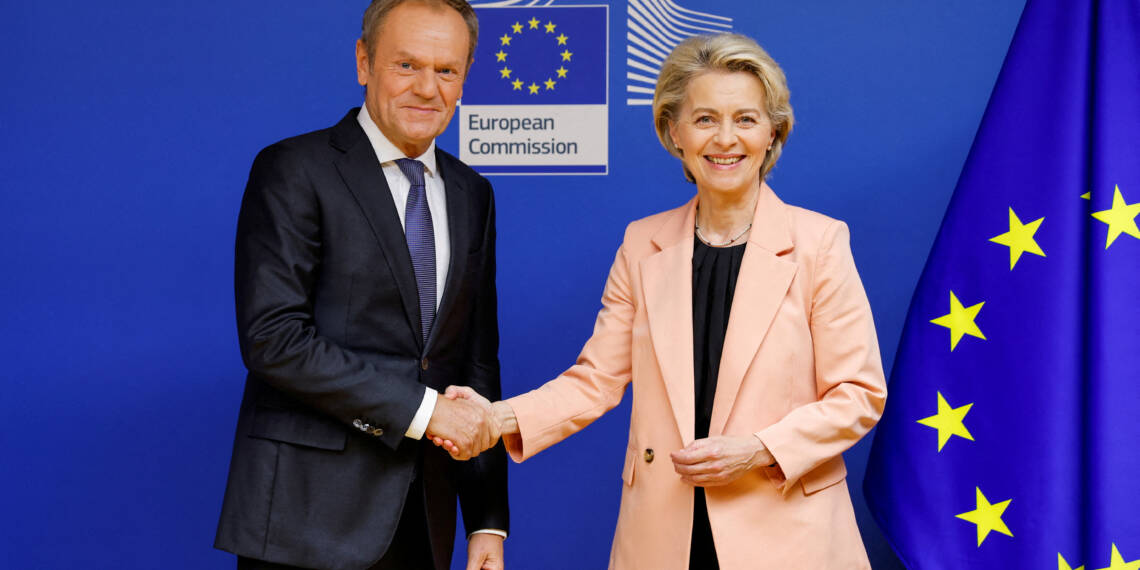The European Union’s recent decision to drop its legal proceedings against Poland is not a testament to justice or reconciliation—it is a glaring demonstration of the EU’s manipulative power dynamics, steeped in ideological warfare. This whole saga began in 2017 when the EU launched Article 7 sanctions proceedings against Poland. The allegations? That judicial reforms by Poland’s Law and Justice (PiS) government, which proposed changes in the judicial appointment process, were undermining the rule of law. This move by the EU was nothing short of coercive, an ideological cudgel aimed squarely at beating down dissenting voices within the union.
Let’s be clear: the EU’s actions were never about safeguarding democracy or the rule of law. Instead, they were a punitive strike against a government that dared to challenge the Eurocratic consensus. By threatening Poland with the loss of voting rights and withholding over €100 billion earmarked for post-Covid recovery, the EU sought to economically strangle Poland into submission. The underlying message was unmistakable: align with EU ideology, or suffer the consequences.
The sudden reversal of this stance, with the EU sheepishly admitting the absence of a ‘clear risk of a serious breach of the rule of law,’ exposes the farcical nature of its previous assertions. The only significant political shift in Poland has been the election of Donald Tusk, a pro-EU figure, displacing the PiS government. His ascent to power and vague promises to amend PiS’s judicial reforms were enough for the EU to perform an about-face. Ursula von der Leyen’s effusive praise for Tusk’s ‘efforts’ reeks of a superficial, orchestrated end to what was a seven-year campaign of political strong-arming.
The real casualty here is the principle of national sovereignty and the integrity of democratic processes within the EU. As long as the EU continues to enforce ideological homogeneity through economic and political coercion, the ideals of genuine democracy and respect for diverse viewpoints within the union remain in jeopardy. Poland’s ordeal is a stark reminder that in the EU’s quest for uniformity, dissent is not merely discouraged; it is punished.
The European Union’s recent actions reveal a stark hypocrisy and a ruthless pursuit of ideological domination, all under the guise of maintaining the “rule of law.” With the change in Poland’s government from the PiS to Tusk, the EU’s tactics have become glaringly obvious. The swift release of €137 billion previously frozen under the Article 7 dispute immediately following Tusk’s rise to power is nothing short of a bribe for compliance. This massive financial incentive, which included a €6.3 billion installment last month, sends a chilling message across the EU: conform to Brussels’ political demands, or face severe economic repercussions.
This financial strong-arming is part of a broader, more cynical strategy. When the new government, aligned with EU interests, took steps that should have sparked outrage—like the sacking of top court judges and the aggressive purging of media and cultural institutions—there was nothing but silence from Brussels. Actions that were condemned under PiS are now overlooked or outright supported under Tusk, revealing a double standard that prioritizes political alignment over genuine legal principles.
Moreover, the Commission’s non-reaction to Tusk’s authoritarian moves, such as the illegal shutdown of TVP Media and the use of police force against former officials, strips away any pretense of defending democracy. The EU’s approach is transparently hypocritical—judicial independence and media freedom are only upheld when they serve Brussels’ interests.
This behavior is emblematic of the EU’s neocolonial attitude, using economic leverage and selective enforcement of rules to control member states. The EU, under the guise of uniformity and legality, is enforcing a regime of ideological submission. As long as the leadership of a member state is willing to toe the line, it appears they can bend the rule of law to their liking with impunity. This is not the union of equal partners it claims to be, but an empire enforcing its will on vassal states.








